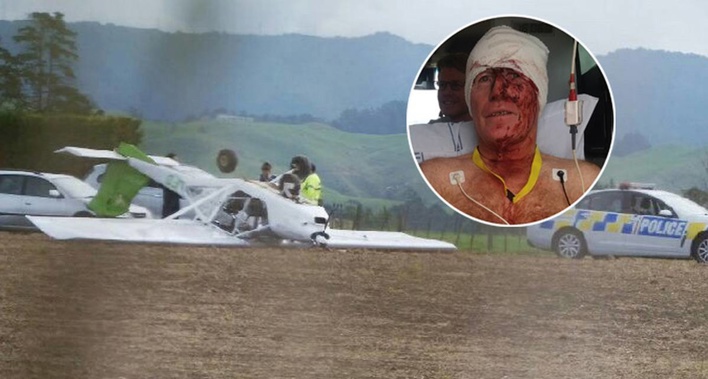
Broadcaster Rod Vaughan says a drone may have collided with the plane he was flying moments before he was forced to make a terrifying crash landing near Waihi.
The veteran TV reporter, who lives in Katikati, told the Bay of Plenty Times he was taking his son Richard, who was visiting from Germany, on a flight over the Western Bay.
They had set off from Thames about 2.30pm in a small plane belonging to the Hauraki Aviation Club, of which he is a member.
They were travelling over Waihi about 3.10pm when the windscreen of the plane "exploded", allowing a rush of air to enter the cockpit.
"The wind coming through was so forceful that it blew my headset into the back of the plane, so I had no communications."
The air travelling through the plane was so forceful it also smashed the side and back windows of the plane, and the noise inside the cockpit was incredibly loud.
"The only option was to get down as soon as possible," Vaughan said.
/arc-anglerfish-syd-prod-nzme.s3.amazonaws.com/public/Q7G4FGAI4RGGTPZQ72KWWOC4QY.jpg?width=525&height=934)
Rod Vaughan in an ambulance after the crash. (Photo / Supplied)
He spotted a field south of Waihi and attempted to make an emergency landing. He estimated the plane was travelling between 80 and 90kmh when it approached the field, clipping the top of a hedge. The plane landed hard, breaking the nose wheel before tipping over soon after impact.
"It all happened in about 30 seconds," Vaughan said.
Both Vaughan and his son were still strapped to their harnesses in the upside-down aircraft.
Blood was dripping down Vaughan's face from a large gash in his head; he was unable to get release himself from the harness. His son managed to help him out of the plane and emergency services were alerted to the crash.
They were both taken by ambulance to Tauranga Hospital. His son had several bad contusions, and Vaughan was treated for the large gash he had sustained during the crash landing.
Although he did not see what caused the windscreen to shatter, he suspected it might have been a drone after discounting the possibility it could have been caused by a bird strike or a shot from a high-velocity rifle.
The most probable explanation is that it was a drone," he said.
Vaughan said there had been a lot of drone activity in the area and members of the Hauraki Aviation Club had expressed concern about possible collisions with aircraft.
Vaughan, who has worked as an investigative reporter for television news and current affairs, said as far as he was aware it would be the first time a drone had caused a plane to crash if his suspicion proved correct.
Tighter rules needed to be in place regarding the use of drones, he said.
/arc-anglerfish-syd-prod-nzme.s3.amazonaws.com/public/VVPIT5TPDBGE7JBJUL75S3OY7Y.jpg?width=525&height=350)
Former TV journalist Rod Vaughan. (Photo / File)
Take your Radio, Podcasts and Music with you









